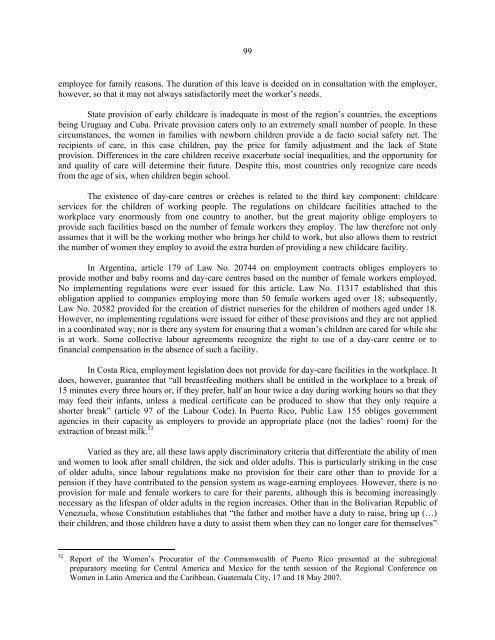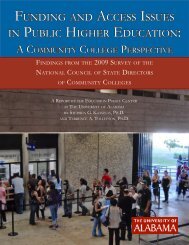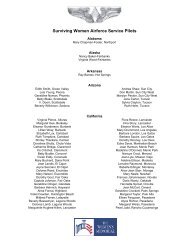Women in Latin America and the Caribbean - Cepal
Women in Latin America and the Caribbean - Cepal
Women in Latin America and the Caribbean - Cepal
You also want an ePaper? Increase the reach of your titles
YUMPU automatically turns print PDFs into web optimized ePapers that Google loves.
99<br />
employee for family reasons. The duration of this leave is decided on <strong>in</strong> consultation with <strong>the</strong> employer,<br />
however, so that it may not always satisfactorily meet <strong>the</strong> worker’s needs.<br />
State provision of early childcare is <strong>in</strong>adequate <strong>in</strong> most of <strong>the</strong> region’s countries, <strong>the</strong> exceptions<br />
be<strong>in</strong>g Uruguay <strong>and</strong> Cuba. Private provision caters only to an extremely small number of people. In <strong>the</strong>se<br />
circumstances, <strong>the</strong> women <strong>in</strong> families with newborn children provide a de facto social safety net. The<br />
recipients of care, <strong>in</strong> this case children, pay <strong>the</strong> price for family adjustment <strong>and</strong> <strong>the</strong> lack of State<br />
provision. Differences <strong>in</strong> <strong>the</strong> care children receive exacerbate social <strong>in</strong>equalities, <strong>and</strong> <strong>the</strong> opportunity for<br />
<strong>and</strong> quality of care will determ<strong>in</strong>e <strong>the</strong>ir future. Despite this, most countries only recognize care needs<br />
from <strong>the</strong> age of six, when children beg<strong>in</strong> school.<br />
The existence of day-care centres or crèches is related to <strong>the</strong> third key component: childcare<br />
services for <strong>the</strong> children of work<strong>in</strong>g people. The regulations on childcare facilities attached to <strong>the</strong><br />
workplace vary enormously from one country to ano<strong>the</strong>r, but <strong>the</strong> great majority oblige employers to<br />
provide such facilities based on <strong>the</strong> number of female workers <strong>the</strong>y employ. The law <strong>the</strong>refore not only<br />
assumes that it will be <strong>the</strong> work<strong>in</strong>g mo<strong>the</strong>r who br<strong>in</strong>gs her child to work, but also allows <strong>the</strong>m to restrict<br />
<strong>the</strong> number of women <strong>the</strong>y employ to avoid <strong>the</strong> extra burden of provid<strong>in</strong>g a new childcare facility.<br />
In Argent<strong>in</strong>a, article 179 of Law No. 20744 on employment contracts obliges employers to<br />
provide mo<strong>the</strong>r <strong>and</strong> baby rooms <strong>and</strong> day-care centres based on <strong>the</strong> number of female workers employed.<br />
No implement<strong>in</strong>g regulations were ever issued for this article. Law No. 11317 established that this<br />
obligation applied to companies employ<strong>in</strong>g more than 50 female workers aged over 18; subsequently,<br />
Law No. 20582 provided for <strong>the</strong> creation of district nurseries for <strong>the</strong> children of mo<strong>the</strong>rs aged under 18.<br />
However, no implement<strong>in</strong>g regulations were issued for ei<strong>the</strong>r of <strong>the</strong>se provisions <strong>and</strong> <strong>the</strong>y are not applied<br />
<strong>in</strong> a coord<strong>in</strong>ated way; nor is <strong>the</strong>re any system for ensur<strong>in</strong>g that a woman’s children are cared for while she<br />
is at work. Some collective labour agreements recognize <strong>the</strong> right to use of a day-care centre or to<br />
f<strong>in</strong>ancial compensation <strong>in</strong> <strong>the</strong> absence of such a facility.<br />
In Costa Rica, employment legislation does not provide for day-care facilities <strong>in</strong> <strong>the</strong> workplace. It<br />
does, however, guarantee that “all breastfeed<strong>in</strong>g mo<strong>the</strong>rs shall be entitled <strong>in</strong> <strong>the</strong> workplace to a break of<br />
15 m<strong>in</strong>utes every three hours or, if <strong>the</strong>y prefer, half an hour twice a day dur<strong>in</strong>g work<strong>in</strong>g hours so that <strong>the</strong>y<br />
may feed <strong>the</strong>ir <strong>in</strong>fants, unless a medical certificate can be produced to show that <strong>the</strong>y only require a<br />
shorter break” (article 97 of <strong>the</strong> Labour Code). In Puerto Rico, Public Law 155 obliges government<br />
agencies <strong>in</strong> <strong>the</strong>ir capacity as employers to provide an appropriate place (not <strong>the</strong> ladies’ room) for <strong>the</strong><br />
extraction of breast milk. 52<br />
Varied as <strong>the</strong>y are, all <strong>the</strong>se laws apply discrim<strong>in</strong>atory criteria that differentiate <strong>the</strong> ability of men<br />
<strong>and</strong> women to look after small children, <strong>the</strong> sick <strong>and</strong> older adults. This is particularly strik<strong>in</strong>g <strong>in</strong> <strong>the</strong> case<br />
of older adults, s<strong>in</strong>ce labour regulations make no provision for <strong>the</strong>ir care o<strong>the</strong>r than to provide for a<br />
pension if <strong>the</strong>y have contributed to <strong>the</strong> pension system as wage-earn<strong>in</strong>g employees. However, <strong>the</strong>re is no<br />
provision for male <strong>and</strong> female workers to care for <strong>the</strong>ir parents, although this is becom<strong>in</strong>g <strong>in</strong>creas<strong>in</strong>gly<br />
necessary as <strong>the</strong> lifespan of older adults <strong>in</strong> <strong>the</strong> region <strong>in</strong>creases. O<strong>the</strong>r than <strong>in</strong> <strong>the</strong> Bolivarian Republic of<br />
Venezuela, whose Constitution establishes that “<strong>the</strong> fa<strong>the</strong>r <strong>and</strong> mo<strong>the</strong>r have a duty to raise, br<strong>in</strong>g up (…)<br />
<strong>the</strong>ir children, <strong>and</strong> those children have a duty to assist <strong>the</strong>m when <strong>the</strong>y can no longer care for <strong>the</strong>mselves”<br />
52<br />
Report of <strong>the</strong> <strong>Women</strong>’s Procurator of <strong>the</strong> Commonwealth of Puerto Rico presented at <strong>the</strong> subregional<br />
preparatory meet<strong>in</strong>g for Central <strong>America</strong> <strong>and</strong> Mexico for <strong>the</strong> tenth session of <strong>the</strong> Regional Conference on<br />
<strong>Women</strong> <strong>in</strong> Lat<strong>in</strong> <strong>America</strong> <strong>and</strong> <strong>the</strong> <strong>Caribbean</strong>, Guatemala City, 17 <strong>and</strong> 18 May 2007.











